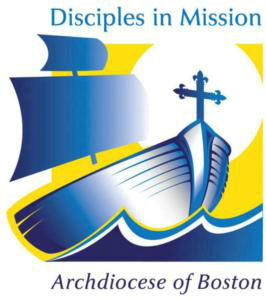Promises
The Rite of Ordination of Priests is filled with beautiful prayers and ritual actions as well as meaningful passages from Sacred Scripture. Those who were present at the Cathedral on May 24, or watched the ceremony on The CatholicTV Network can attest to this.
At one point in the rite, candidates for ordination, one by one, kneel before the ordinary of the archdiocese, Cardinal Seán P. O'Malley. This part of the rite is called The Promise of Obedience.
Here are the directions and text from the ritual: "...Then the candidate goes to the bishop and, kneeling before him, places his joined hands between those of the bishop... ."
The bishop then asks, "Do you promise respect and obedience to me and my successors?" and the candidate responds, "I do!"
The bishop closes this part of the rite with: "May God who has begun the good work in you bring it to fulfillment."
These are words of hope and great expectation. Our nine newly ordained priests are now settling in to their first assignments. Four of the nine are serving in parish collaboratives. They represent 2.5 percent of the 401 Boston priests actively serving in the archdiocese. By far, most active Boston priests are assigned to parish ministry. In the first week of June, more than 90 priests moved to new assignments. The number is staggering and is worth considering.
Vocations involve promises. Marriage, priesthood, deaconate, religious life -- all of these ask a commitment of participants; vows, promises, oaths, professed publically. Many professions in the secular world ask members to take an oath or sign a code of conduct, promising that their actions will live up to the standards of the profession.
Ordination asks more. With the promise of obedience, the priest puts himself completely at the service of the Church and at the service of the ordinary. Past custom in our archdiocese followed, for the most part, a set formula for length of a parish assignment of a parochial vicar or pastor. In recent years, some assignments have been extended, resulting in relationships between priest and people that have deepened over time. The priest who gives us Jesus in the Eucharist, forgives our sins in the name of Christ, buries our loved ones, witnesses the marriage of our children, or stands at the bedside of a dying parent or spouse, has become an important part of the family. These life changing experiences are the cement between priest and parishioner -- and not simply the priest, but this priest: Father ___. Likewise, one can imagine the feelings of the priest when he is asked to witness the marriage of a person who was part of the parish confirmation program years earlier, and later to baptize the child of that marriage. The roots of shared experiences are precious.
All of this makes moving hard. Even when the new assignment is exciting, challenging, and groundbreaking -- as is the case with the 20 new pastors of Phase II Collaboratives -- moving is hard. There is no way around it. Jesus Christ is the same yesterday, today, and forever (Heb.13:8). The sacraments are the same. Sacred Scripture is the same. But oh the things that change! The potential for sensory overload is high as the priest comes into a new living arrangement, new office, new staff, new church, new physical plant, new parish -- or parishes -- a whole new set of names to learn.
The parishioners of this new parish or collaborative are dealing with change as well. They may be mourning the loss of their former pastor or parochial vicar who has moved. They may have heard about the "new guy" but they don't know him. Is he approachable? Does he have a sense of humor? Are his homilies good? Are they long? Will he respect their history? There is fragility all around, shepherd and flock. Parishioners who welcome the "new guy" with an open mind and warm smile will be an enormous help in forwarding the mission.
There are very few certainties in life -- God's love, redemption, death and taxes, and maybe a few others. The implementation of Disciples in Mission is not a slam dunk, but our priests, especially the 90-plus who have begun new assignments, remember and live out the promise they made at ordination: they go where they are sent and serve where they are needed. They give evidence by their actions that all of us must try our best to navigate this new terrain. To paraphrase a familiar saying: We may not be successful but we must try. During these weeks and months of newness we need to be gentle with each other, presume the best, and pray to St. John Vianney, patron saint of parish priests, in thanksgiving for the good men who serve "in persona Christi" and keep their promises.
"May God who has begun the good work in you bring it to fulfillment."
Susan Abbott is Coordinator of Parish Outreach for the Archdiocese of Boston's Office of Pastoral Planning.
- SUSAN ABBOTT IS EVANGELIZATION ASSOCIATE, OUR LADY OF GOOD VOYAGE SHRINE.



















